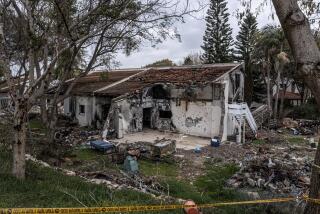Iraqi inquiries find excessive force in Sunni protest camp raid
- Share via
BAGHDAD — Iraqi security used disproportionate force, including shooting unarmed civilians, during a raid on an encampment of Sunni Arab protesters last week that left 45 people dead, according to two government investigations and foreign diplomats.
The predawn raid in the city of Hawija in Kirkuk province April 23 involved security forces demanding that protesters hand over demonstrators suspected of killing an Iraqi soldier four days earlier, officials said. Shooting erupted during the raid, enraging Sunnis and leading to violence in other parts of the country.
The United Nations announced Thursday that April was the bloodiest month for Iraq in five years. At least 712 people were killed, the U.N. said.
A complete account of the Hawija raid has yet to emerge. A still-incomplete Cabinet-level investigation has interviewed only military officers, and a parliament-level inquiry has spoken only with protesters. Security officers refused to speak to parliament investigators. The parliament report was leaked to the Los Angeles Times.
A close ally of Prime Minister Nouri Maliki, Deputy Prime Minister Hussein Shahristani, told The Times and another news organization Tuesday that security forces “responded disproportionately with very heavy firing against their orders, and as a result tens of people were killed.”
Shahristani also said that the protest site was a threat: Three members of the armed insurgent group Naqshabandi were found dead there, and unfired weapons were later found hidden in mattresses inside the protest camp.
Nonetheless, Shahristani said, the Shiite Muslim-led government was serious about investigating those who sprayed indiscriminate gunfire.
Sunni Deputy Prime Minister Saleh Mutlaq, who is leading the Cabinet-level inquiry, said among the dead in the Hawija violence were five teenagers, two of them either 13 or 14 years old. Pictures reviewed by lawmakers, foreign diplomats and The Times taken in the attack’s immediate aftermath showed several bullet-riddled corpses bound at the hands and feet.
Hawija “was meant to be an army action looking for weapons [and] to isolate extremists,” said one foreign diplomat in Baghdad. “It became a vendetta out of all proportions.… This was carnage.”
According to the account compiled by the parliament, and also to several foreign diplomats, a belief exists among the prime minister’s circle that it was essential to use military force to end the anti-government demonstrations.
Early in the morning of April 23, Mutlaq woke up Acting Defense Minister Saadoun Dulaimi and asked him to allow more time to work out a compromise before security forces searched the area for weapons and the attackers.
According to the report, Dulaimi answered, “Let who is going to be killed, be killed; they are terrorists and the important thing is the nation’s authority.”
On Thursday, Iraqi troops were massing outside Ramadi in western Anbar province, where the security forces have demanded the city hand over the killers of five Iraqi soldiers who died over the weekend near the weekly demonstrations. Locals worried, despite a tentative deal to avoid a military operation, that commanders might move in to hunt down the wanted men and trigger a bloodbath.
Diplomats and Mutlaq worry that Dulaimi and others in the government were keen to break the Sunni protests with another violent crackdown. The prime minister and his political allies have given speeches in which they have threatened to attack the Sunni protest camps, describing the demonstrations as a front for terrorists.
“Saadoun Dulaimi believes that without having a clash, the protests will never end,” Mutlaq said.
Dulaimi was not available for comment Thursday.
Mutlaq said he doubted anyone would be held accountable for what happened in Hawija.
“I don’t think it will happen because the battle is continuing,” he said, in reference to government efforts to control Sunni protests around the country. “They say they don’t want to punish the officers and lower their morale.”
More to Read
Sign up for Essential California
The most important California stories and recommendations in your inbox every morning.
You may occasionally receive promotional content from the Los Angeles Times.










